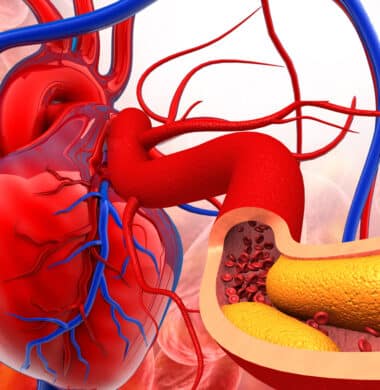At What Age Do Heart Problems Start?

Most people know that the risk of heart problems increases with age. This leads many people to the mistaken belief that heart problems start at a particular age. However, the truth is that heart problems can affect people of all ages.
Heart problems don’t start suddenly. They build up silently over years until they become severe enough that you notice them in the form of heart palpitations, low exercise tolerance, or even a heart attack. It’s important to be aware of your risk of heart problems so you can address them before they become serious or even deadly.
Average Age of First Heart Attack
When people ask at what age heart problems start, they often want to know the average age of a person’s first heart attack. The prevailing figures are 65.6 for men and 72.0 for women. However, these figures are based on older data and don’t include the recent trend of younger heart attacks or the potential impact of COVID on heart problems, which we’ll talk about more later.
In addition, remember that heart attacks don’t happen suddenly without cause. Often, people have been experiencing problems with their heart for years. Some of these, like atherosclerosis, in which buildup of fat and other materials narrows the blood vessels, might go unnoticed. Others, such as reduced exercise tolerance, might be dismissed as just a sign of getting older. Take these symptoms seriously. Talk to your doctor about them and consider preventive cardiology.
How the Heart Changes with Age
Although these aren’t necessarily heart problems, you should be aware that your heart is changing as you get older. The symptoms you experience may be related to these changes and may signify more serious problems.
- Ability to beat faster can decrease – Your heart may not beat as fast when you exercise, though your resting heart rate may stay the same.
- Heart palpitations – As you get older, you may experience the sensation of your heart fluttering or skipping a beat. This might be a symptom of heart arrhythmias.
- Thickening heart wall – The heart wall can thicken with age and can also occur due to hypertension and can increase the risk of congestive heart failure as people age, reducing the size of the chambers, so your heart can’t pump as much blood. This also contributes to the risk of heart arrhythmias.
- Heart valve stiffening – Heart valves control the flow of blood within and outside the heart. As these valves stiffen, they can reduce blood flow or leak.
These changes can happen so gradually that you might not notice symptoms until they get severe.
Increasing Heart Attack Frequency among Young Patients

In other words, nearly a third of all heart attack hospitalizations were for people younger than we would expect. Young women saw a larger increase in heart attack hospitalizations.
Risk Factors for Early Heart Attack
The ARIC study results highlighted many risk factors linked to early heart attack risk. This adds to or strengthens our knowledge of certain risk factors for early heart attacks. Be on the lookout for heart problems at a young age if you have any of these risk factors:
- Smoking – Smoking is one of the most important factors for your heart risk. Smokers may be up to 8 times more likely to have a major heart attack than other people their age.
- High blood pressure – Hypertension is a well-known risk factor for heart attack and is a major risk for stroke. If you have elevated blood pressure, talk to your doctor about care or a referral to a cardiologist.
- Type 2 diabetes – Type 2 diabetes often comes with elevated heart risk. That’s because both conditions are related to being overweight. In addition to talking to doctors about managing diabetes, ask about heart risks.
- Pregnancy complications – Women who experience complications during their pregnancy like preeclampsia, premature birth, and excessive weight gain are more likely to develop heart problems at a young age.
- Family history and race – Many aspects of heart disease are genetic. If you have a family history of young heart attacks, you are likely at a high risk for one yourself. Another marker of genetic risk is that young black men and women have a higher risk for heart attacks than young white men and women.
In addition, young women hospitalized for heart attacks were less likely to have received preventive cardiology interventions like lipid-lowering therapies, antiplatelets, and beta blockers. This is likely because young women and their doctors have been less vigilant about heart disease risks at a young age. If you have any of the risk factors above and your doctor isn’t considering your heart attack risk, you must bring it up.
Post-COVID Heart Problems
In addition to the pre-pandemic increase in heart attacks among young people, there has been a surge in heart attack risk for young people linked to severe COVID-19. During the first years of the COVID pandemic, heart attacks became more frequent among even younger patients. Young adults aged 25-44 experienced 30% more heart attacks than historical data would suggest.
In addition, many people who had severe COVID continue to struggle with cardiovascular effects, including POTS (postural orthostatic tachycardia syndrome), which leads to extremely rapid heartbeat after standing.
We still don’t know what the long-term impact of COVID will be on cardiovascular health, but people who had severe COVID or experience long COVID symptoms should consult with their doctor or a cardiologist about their risks.
Preventive Cardiology Is Best Started Young
If you have any risk factors for heart problems at a young age, you shouldn’t wait until you’re “old enough” to start worrying about your heart. Start checking on your heart health now with some basic tests, like blood tests to monitor your cholesterol and blood sugar, and blood pressure monitoring. If there are more reasons to be concerned, you should investigate more definitive tests like getting a calcium heart score.
If you want to talk to a preventive cardiologist about safeguarding your heart health, please contact South Denver Cardiology Associates today for an appointment at one of our clinics in Littleton, Englewood, Denver, Castle Rock, or Parker.
- 9 Tips to Reduce Holiday Stress - December 11, 2025
- 6 Tips for Exercising Outdoors with a Heart Condition - May 19, 2025
- Lifestyle Changes That Can Help Manage Arrhythmia - April 30, 2025
Sign Up
As with any health concerns, your specific treatment program should be discussed thoroughly with your primary care physician as well as any specialists who may need to be consulted – like a cardiologist.
Sign Up
